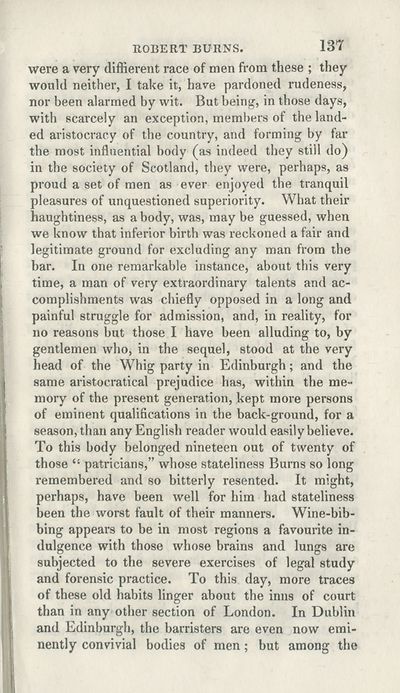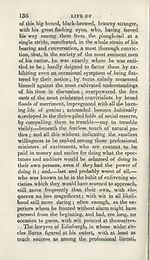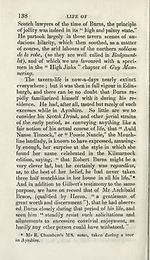Scotland/Scots > Life of Robert Burns
(147)
Download files
Complete book:
Individual page:
Thumbnail gallery: Grid view | List view

ROBERT BURNS. 137
were a very diffierent race of men from these ; they
would neither, I take it, have pardoned rudeness,
nor been alarmed by wit. But being, in those days,
with scarcely an exception, members of the land¬
ed aristocracy of the country, and forming by far
the most influential body (as indeed they still do)
in the society of Scotland, they were, perhaps, as
proud a set of men as ever enjoyed the tranquil
pleasures of unquestioned superiority. What their
haughtiness, as a body, was, may be guessed, when
we know that inferior birth was reckoned a fair and
legitimate ground for excluding any man from the
bar. In one remarkable instance, about this very
time, a man of very extraordinary talents and ac¬
complishments was chiefly opposed in a long and
painful struggle for admission, and, in reality, for
no reasons but those I have been alluding to, by
gentlemen who, in the sequel, stood at the very
head of the Whig party in Edinburgh; and the
same aristocratical prejudice has, within the me¬
mory of the present generation, kept more persons
of eminent qualifications in the back-ground, for a
season, than any English reader would easily believe.
To this body belonged nineteen out of twenty of
those t! patricians,” whose stateliness Burns so long
remembered and so bitterly resented. It might,
perhaps, have been well for him had stateliness
been the worst fault of their manners. Wine-bib¬
bing appears to be in most regions a favourite in¬
dulgence with those whose brains and lungs are
subjected to the severe exercises of legal study
and forensic practice. To this day, more traces
of these old habits linger about the inns of court
than in any other section of London. In Dublin
and Edinburgh, the barristers are even now emi¬
nently convivial bodies of men; but among the
were a very diffierent race of men from these ; they
would neither, I take it, have pardoned rudeness,
nor been alarmed by wit. But being, in those days,
with scarcely an exception, members of the land¬
ed aristocracy of the country, and forming by far
the most influential body (as indeed they still do)
in the society of Scotland, they were, perhaps, as
proud a set of men as ever enjoyed the tranquil
pleasures of unquestioned superiority. What their
haughtiness, as a body, was, may be guessed, when
we know that inferior birth was reckoned a fair and
legitimate ground for excluding any man from the
bar. In one remarkable instance, about this very
time, a man of very extraordinary talents and ac¬
complishments was chiefly opposed in a long and
painful struggle for admission, and, in reality, for
no reasons but those I have been alluding to, by
gentlemen who, in the sequel, stood at the very
head of the Whig party in Edinburgh; and the
same aristocratical prejudice has, within the me¬
mory of the present generation, kept more persons
of eminent qualifications in the back-ground, for a
season, than any English reader would easily believe.
To this body belonged nineteen out of twenty of
those t! patricians,” whose stateliness Burns so long
remembered and so bitterly resented. It might,
perhaps, have been well for him had stateliness
been the worst fault of their manners. Wine-bib¬
bing appears to be in most regions a favourite in¬
dulgence with those whose brains and lungs are
subjected to the severe exercises of legal study
and forensic practice. To this day, more traces
of these old habits linger about the inns of court
than in any other section of London. In Dublin
and Edinburgh, the barristers are even now emi¬
nently convivial bodies of men; but among the
Set display mode to:
![]() Universal Viewer |
Universal Viewer | ![]() Mirador |
Large image | Transcription
Mirador |
Large image | Transcription
| Antiquarian books of Scotland > Scotland/Scots > Life of Robert Burns > (147) |
|---|
| Permanent URL | https://digital.nls.uk/108247623 |
|---|
| Description | Thousands of printed books from the Antiquarian Books of Scotland collection which dates from 1641 to the 1980s. The collection consists of 14,800 books which were published in Scotland or have a Scottish connection, e.g. through the author, printer or owner. Subjects covered include sport, education, diseases, adventure, occupations, Jacobites, politics and religion. Among the 29 languages represented are English, Gaelic, Italian, French, Russian and Swedish. |
|---|

